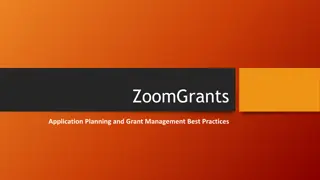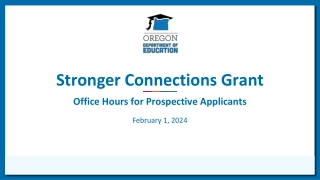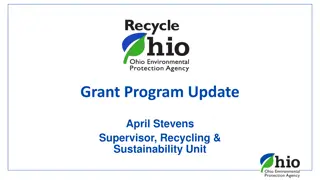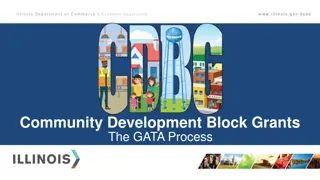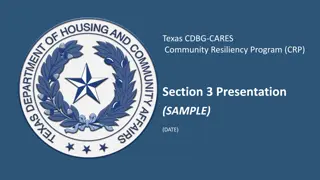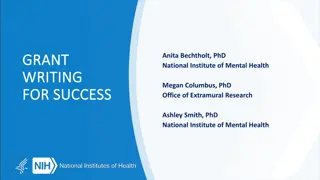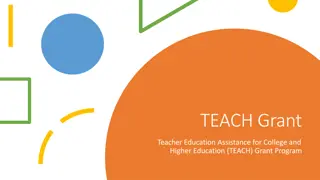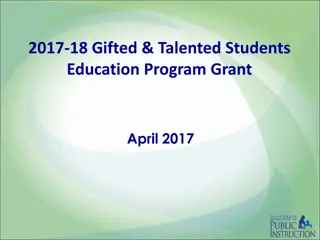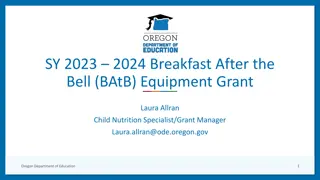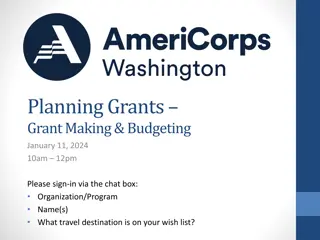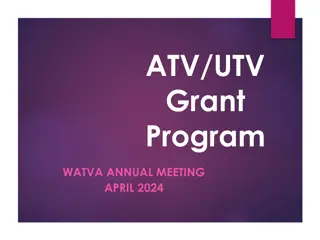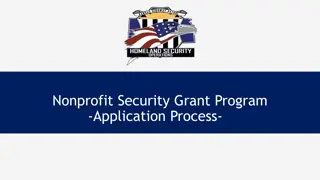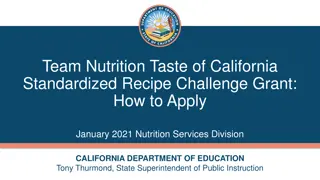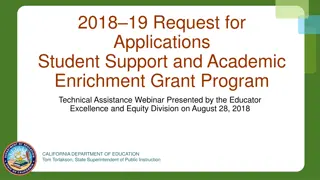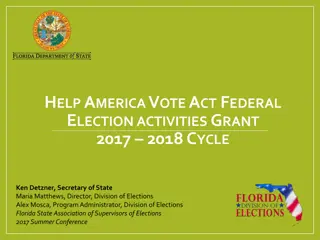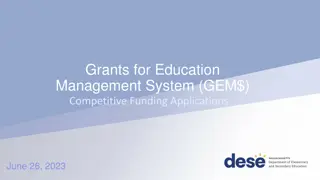Antibias Education Grant Program Overview
The Antibias Education Grant Program, established by Assembly Bill 130, aims to combat racism and bias in California's public schools. With funding available through 2025-26, the program supports educators in creating inclusive environments and addressing structural barriers to promote equity in student outcomes.
Download Presentation

Please find below an Image/Link to download the presentation.
The content on the website is provided AS IS for your information and personal use only. It may not be sold, licensed, or shared on other websites without obtaining consent from the author. Download presentation by click this link. If you encounter any issues during the download, it is possible that the publisher has removed the file from their server.
E N D
Presentation Transcript
Antibias Education Grant Program Request for Applications Application Webinar Presented by the Educator Excellence and Equity Division June 21, 2023 CALIFORNIA DEPARTMENT OF EDUCATION Tony Thurmond, State Superintendent of Public Instruction
Housekeeping Webinar participants have been placed on mute. Question/Answer session toward the end of the webinar. PowerPoint with notes and recorded webinar will be available on the California Department of Education (CDE) Antibias Education web page at https://www.cde.ca.gov/ci/pl/antibiasgrant.asp. 2
Program Authority The Antibias Education Grant Program funding was established by Assembly Bill 130 Chapter 44 Section 157 of the 2021 22 California State Budget. The law requires that the State Superintendent of Public Instruction (SSPI) award a minimum of 50 grants to local educational agencies (LEAs). Funds are available for expenditure or encumbrance through the 2025 26 fiscal year. 3
Program Funding (1) For the 2021 22 fiscal year, the sum of $10 million was appropriated from the General Fund to the SSPI. The SSPI shall award a minimum of 50 grants to LEAs. An LEA shall not receive a grant of less than $75,000 and no more than $200,000. These funds are available for expenditure or encumbrance through the 2025 26 fiscal year. LEAs may expend all Antibias Education Grant Program funds early. Regardless of whether funds are expended early, LEAs must commit to participating in the four community of practice convenings. 4
Program Funding (2) On June 30, 2022, AB 181 Section 138 of the Education Omnibus Budget Trailer Bill was chaptered. The legislation appropriates $10 million for the 2022 23 fiscal year for the Antibias Education Grant Program. The CDE may utilize this competitive grant process to award this additional $10 million. The 2022 23 funding requires that the SSPI award a minimum of 50 grants to LEAs. 5
Program Purpose The purpose of the Antibias Education Grant Program is to prevent, address, and eliminate racism and bias in all California public schools, and making all public schools inclusive and supportive of all people. The grant program seeks to provide professional support to educators to develop skill and competency to interrupt and eliminate bias by activating changes to structures, processes, and practices that when implemented will make a real difference in the educational experiences and outcomes of students. 6
Program Overview (1) Antibias Education Grant Program funds may be used for training and resources to prevent and address bias or prejudice toward any group of people based on race, ethnicity, religion, gender, gender identity, sexual orientation, disability, immigration status, language, or any actual or perceived characteristic listed in Section 422.55 of the Penal Code. Emphasis shall be on preventing bias or prejudice toward groups, including, but not limited to, Jews and members of the Jewish community, African Americans, Asian-Pacific Islanders, Latinos, and people who are lesbian, gay, bisexual, transgender, or questioning youth. 7
Program Overview (2) Allowable activities for an Antibias Education Grant may include, but are not limited to, any of the following: Professional development on topics that address hate, bigotry, racism, or any form of bias or prejudice, including, but not limited to, design features of equitable learning environments, classroom management techniques, emotional wellness and self-regulation, and strategies designed to increase teachers skills for mitigating bias, fostering caring developmental relationships, and practices and approaches when managing pupils in academic and disciplinary settings to support deep and engaged learning. 8
Program Overview (3) Opportunities for teachers, administrators, pupils, other school staff, and members of the governing board or body of the LEA to review policies, practices, and procedures that can promote bias, such as referrals for discipline, special education, and course placement, and to update those policies, practices, and procedures to foster in pupils a sense of belonging and connection. The development (or updating) of a comprehensive bias mitigation or diversity plan based on the identified needs of the LEA using its data and tied to specific outcomes, such as increasing staff diversity or more racially proportionate pupil discipline referrals. 9
Program Overview (4) Curriculum that is appropriate for pupils in kindergarten or any of grades one through twelve, inclusive of topics that address hate, bigotry, racism, or any form of bias or prejudice, promote self-love, self-acceptance, and pride in one s multiple identities, understanding of one s own and others cultural histories and contributions, and empathy for and meaningful connections with others. Support of pupil-initiated and pupil-led efforts to combat hate, bigotry, racism, or any form of bias or prejudice, and to co-design new approaches to mitigate bias and foster a sense of belonging and connection, and to ensure that decisions, actions, and designs are informed by student voice, needs, and aspirations. 10
Defining Evidence-Based (1) Professional development and curriculum for the Antibias Education Grant Program shall use evidence-based strategies. For the purposes of this grant, the CDE has borrowed the following definition for evidence-based practice. As defined by the Every Student Succeeds Act (https://www.congress.gov/114/plaws/publ95/PLAW- 114publ95.pdf), an evidence-based practice is an activity, strategy, or intervention that demonstrates a statistically significant effect on improving student outcomes or other relevant outcomes based on strong evidence, moderate evidence, promising evidence, or a rationale with ongoing efforts to examine the effects of activity, strategy or intervention. 11
Defining Evidence-Based (2) Building Equitable Learning Environments (BELE) Equitable Learning Library at https://library.belenetwork.org. Grounded in the pillars of the BELE Framework, these resources describe the changes and processes needed to create supportive, engaging, and caring environments for students and adults to learn and thrive. The BELE Framework, may be found on the BELE Network Framework web page at https://belenetwork.org/library_resources/the-bele-framework. 12
Collaboration with the National Equity Project 13
National Equity Project The National Equity Project is a leadership development and systems change organization committed to developing people s capacity to achieve thriving, self- determining, educated, and just communities. Our mission is to transform the experiences, outcomes, and life options for children and families who have been historically underserved by our institutions and systems. 14
National Equity Project Core Belief The role of rebel leaders is to make inequities visible; to disrupt harmful discourse, practices and policies that perpetuate racialized outcomes; and imagine new ways to engage and co-design with our communities so that each of us (adults and young people) can learn, develop, thrive and experience a sense of belonging. 15
Program Duration The grant period is from September 2023, through March 30, 2026. The CDE shall evaluate the grantee s performance and success. The Antibias Education Grant Program recipients will comply with the reporting needs specified by the CDE. This may include data collection and analysis not proposed by the LEA throughout the expenditure period ending in 2026. 16
Applicant Eligibility (1) Applicant eligibility is limited to LEAs, defined as a school district, county offices of education (COE), or directly funded charter schools, within the State of California that serves students in transitional kindergarten through grade twelve. Applicants must demonstrate a need for additional antibias education and training, and describe how the funds will be used. Community agencies, private schools, individual public schools, and state special schools are not eligible to apply for the Antibias Education Grant Program. 17
Applicant Eligibility (2) Consortiums of LEAs may apply, and each participating LEA in a consortium is eligible to apply for up to $200,000. The maximum grant award for each consortium depends on the number of participating LEAs. The lead applicant will serve as the fiscal agent and be responsible for all grant deliverables. The lead applicant should: Submit one application on behalf of the consortium, and indicate in the Executive Summary all LEAs to be included in the consortium. Include one project budget for the consortium. (The budget narrative should clearly explain how funds will be spent among the consortium members.) No one consortium member may expend more than $200,000. 18
Applicant Eligibility (3) Provide any additional information related to the operations of the consortium in the Proposed Activities section of the online application. Be prepared to provide Letters of Commitment from all consortium members prior to a Grant Award Notification being issued. 19
Resources to Support Application Development 20
Asset-Based Pedagogies CDE s Asset-Based Pedagogies web page. Asset- Based Pedagogies focus on the strengths that diverse students bring to the classroom. It is a direct response to deficit-based models to education of the past. This web page provides definitions and resources. 21
LGBTQ+ Resources CDE s Research, Data and Reports web page. Research, data, and reports on supporting LGBTQ+ students and improving overall school climate for LGBTQ+ students, their educators and their families. CDE s Supporting LGBTQ+ Students web page. Instructional guidance, law, and policies for local educational agencies to support LGBTQ+ students and provide safe learning environments that protect the health and safety of LGBTQ+ students. 22
Transformative Social and Emotional Learning Competencies and Conditions The Transformative Social and Emotional Learning (SEL) Competencies describe the knowledge, skills, dispositions, and capacities that children and young people can develop when the conditions are supportive to their healthy, whole development. The Conditions for Thriving provide recommended practices and actions that adults across the education system can use to co-create conditions that support Transformative SEL development. 23
Quality Professional Learning Standards The Quality Professional Learning Standards (QPLS) lay the foundation for creating a coherent set of professional learning policies and activities that span the career continuum of an educator, leading to improved educator knowledge, skills, and dispositions and, ultimately, increased student learning results. The standards describe the criteria for quality professional learning and point educators and stakeholders toward using evidence-based elements and indicators when making decisions about how to create and/or improve professional learning in their own systems. 24
The National Equity Project Resources https://drive.google.com/file/d/1kYi1s40hXdqxxcGGVrjSTjlnGsCrG wpw/view https://docs.google.com/document/d/1p_hije8fMuUE_OrSas2F90R vLFdJmGWVeyKtFc12o8s/edit https://drive.google.com/file/d/1mdxwnBPuY0_oOsNT8lWcTQl7Rb -A96ib/view https://medium.com/national-equity-project/implicit-bias-structural- racism-6c52cf0f4a92 https://drive.google.com/file/d/1k4V6UWqunKOg9LOaFayRZPFQN Q-WBVZJ/view https://drive.google.com/file/d/13eKih_Dv- qrha4Xs44weHrdtG6wxCCI0/view 25
Additional Resources WestEd sAnti-racist evaluation strategies: A guide for evaluation teams contains strategies to conduct anti- racist evaluations. 26
Requirements of the Antibias Education Grant Program Application 27
Submission Requirements (1) Complete an electronic application available at https://www.cde.ca.gov/fg/fo/r12/antibias22rfa.asp. Online Application Instructions for the Antibias Education Grant Program are included in the Appendix of the Request for Applications (RFA). Respond to all sections of each prompt of the narrative description. 28
Submission Requirements (2) Separately attach supporting evidence, such as budgets, assurances and certifications, and letters of commitment, if applicable. Provide the appropriate digital signature. Submit the application by July 20, 2023, before 4 p.m. Refer to the scoring rubric for the Antibias Education Grant Program to understand how responses for each application will be evaluated by the reading panel. 29
Saving Responses Select the Save Responses button on the first page of the online application if you do not intend to complete the application in one session. Ensure the email address you provide is accurate. Copy the unique URL (web address) for entrance back into the application. 30
Completing the Application Narrative The application narrative for the Antibias Education Grant Program contains the following sections: 1. Executive Summary 2. Theory of Action 3. Demonstrated Need and Past Antibias Efforts 4. Proposed Activities 5. Proposed Metrics 6. Application Budget 31
Completing the Application Budget (1) Covers the entire grant period (September 2023 March 2026). Includes six tabs for completion: - One tab for the cover sheet - One tab for the budget summary - Four tabs for the budget narratives (one tab for each year of the grant) Submit as an attached file. The budget will be reviewed and scored. 32
Completing the Application Budget (2) Proposed Budget Detail must include a detailed budget description for each line item within the grant period Provide sufficient detail and a breakdown/calculation that justifies each line item Group line items by the Object Code services Provide lines for Object Code totals Proposed Budget Summary must provide totals for each Object Code and must align with the Proposed Budget Detail. 33
Completing the Application Budget (3) Ensure that the budget includes funding for at least one team member to participate in person in one community of practice convening. Alternative funding sources may be used to fund the expenses of an additional team member to attend and participate in these meetings. Other funding may be used to procure goods or services from the National Equity Project. However, due to the CDE s partnership with the National Equity Project, Antibias Education Grant Program grant funds may not be used to purchase National Equity Project goods nor services. 34
Review Process Only fully completed applications will be considered eligible for consideration and advance to the Reader Conference. A panel of readers selected for their expertise will read, review, and score each eligible application using a scoring rubric (see rubrics in the RFA). Although scores are important, they will not be the only factor considered when selecting awards. 35
Application Maximum Point Values Section Point Value Executive Summary Theory of Action Demonstrated Need and Past Antibias Efforts Proposed Activities Proposed Metrics Budget and Cost Effectiveness Note: Budgets may be requested to be revised. 4 points 12 points 20 points 24 points 16 points 8 points 36
Application Timeline Activity Date RFA Release June 1, 2023 Application due to the CDE July 20, 2023, by 4 p.m. Intent to Award Posted Week of August 28, 2023 Last day for Appeals to be Received by the CDE One week after Intent to Award is Posted Final Awards Posted September 2023 37
Questions? 38
Resources (1) Applicants may find the following resources helpful in the development of the Antibias Education Grant Program application: CDE Asset Based Pedagogy https://www.cde.ca.gov/ci/pl/assetbasedpedagogies.asp CDE LGBTQ+ Resources https://www.cde.ca.gov/ci/pl/supportlgbtq.asp 39
Resources (2) CDE Transformative SEL Competencies and Conditions https://www.cde.ca.gov/ci/se/tsel.asp QPLS https://www.cde.ca.gov/ci/pl/qpls.asp WestEd sAnti-racist evaluation strategies: A guide for evaluation teams https://www.wested.org/wp-content/uploads/2021/04/anti- racist-evaluations-R10_FINAL-ADA.pdf 40
Educator Excellence and Equity Division Contacts For additional information, contact: The Antibias Education Grant Program Team Email: Antibiasgrants@cde.ca.gov 41


